Skinner's Dress Sense, The Shakedown, The Shield of Honor (1926, 1927, 1929)
Directed by: Emory Johnson, William A. Seiter, William Wyler
Written by: Albert DuMond, Clarence Marks, Gladys Lehman, Leigh Jacobson, Rex Taylor
Starring: Dorothy Gulliver, Jack Hanlon, James Murray, Laura La Plante, Neil Hamilton, Reginald Denny
Eureka Entertainment continue to treat lovers of oldies with this set, a set which will presumably be followed by further volumes. Not having heard of any of these films, I’m going into it blind….
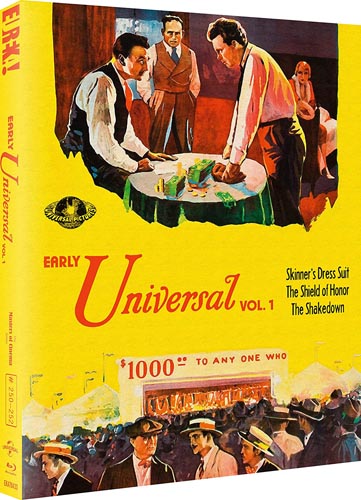
DISC ONE
SKINNER’S DRESS SUIT [1926]
RUNNING TIME: 74 mins
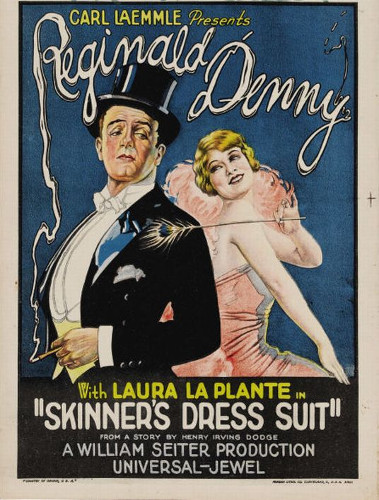
Skinner is a clerk working for a company that makes nuts and bolts. He’s in need of a raise because his wife Honey believes that he’s due for one and also has expensive tastes. Unfortunately, Skinner isn’t as good at his job as Honey thinks, and after summing up the courage to ask his boss McLoughlin for more money, is promptly turned down. However, when he returns home he finds Honey having prepared a celebratory banquet for him, so he tells her he got the raise. Their social standing grows as she spends and spends and spends, but Skinner’s job is hardly secure….
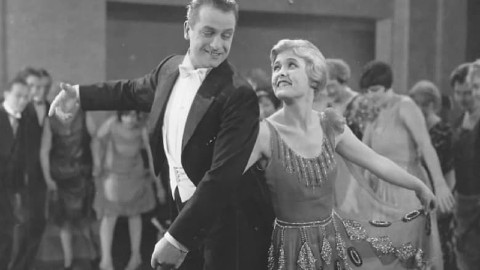
We tend to associate silent comedy with slapstick and stunts, but, then as now, humour came in many forms. Skinner’s Dress Sense is a comedy with more than a dash of Cinderella centering around class with a somewhat sophisticated [though certainly not unapproachable] air and approach that may surprise some. It seems like a kind of forerunner to the screwball comedies which would become popular in the next decade. Of course it still has its simple belly laughs – a gag involving a glass that’s cracked at the bottom is a highlight in this respect, as is an early version of a perennial movie scene which I tend not to find particularly funny though I know I’m in the minority – when a character lets loose and dances, to be then surprised by somebody else entering the room. Hugh Grant had a particularly cringey one in Love Actually. But here, I actually enjoyed the scene, our hero being taught how to dance the ‘Colorado Shuffle’ by his secretary Mrs Crawford before she points to the boss standing behind him, whereupon he imitates her hand movements, thinking that she’s illustrating dance moves. In fact dancing plays a large part in this movie, with a particularly lovely scene where husband and wife are on the phone to each other and he’s teaching her moves and their bottom halves not only can’t stop bobbing about but are forming very suggestive poses. Then they go to a big posh do and, after nobody seems to want to talk to them, hit the dance floor with their moves and suddenly become popular while getting the staid rich folk to lose their inhibitions. But of course all this is based on a lie and this pair shouldn’t really be there at all. If this film were made after 1934, the story would have been a morality tale and definitely punished them for raising above their station or not telling the truth. We would have certainly seen the fall after the rise. However, in 1926 the Production Code was far less strict and therefore people stood a chance of getting away with it.
Does he get away with it? I won’t reveal that, but I will say the expected reversal of fortunes do also come with some surprises. The opening shots are of Skinner’s breakfast before the first of many close-ups of star Reginald Denny. The inter-titles introduce him as “just a commuter”, then Honey “whose chief responsibility in life was to see that Skinner caught the 7.32” and who we see sow a button on his sleeve. Well, this is 1926, the roles of men and women were very different back then so there’s no point in getting uptight about it. She’s been pestering him about this raise, and is so confident that he’ll get it that she suggests he demand for it. Skinner runs like mad to catch his train while a pair of old guys bet coins as to whether he’ll make it or not. There’s some good buildup to Skinner asking, Denny playing the nervousness and the mock arrogance very well. He goes home to find that Honey has already told a friend about it, after which she buys loads of stuff and the two are invited to parties. However, the business really isn’t doing very well. Do we like Skinner despite his masquerade? Well, it helps that, on the two occasions when he may have been about to tell the truth, things steer him away from doing so, though I’m going to be honest and admit that I didn’t really warm to Denny even though he was Universal’s top comedian at the time and then went on to become a prolific character actor. His comedy persona is a bit like that of a a much more down to earth Harold Lloyd but with far less comic timing. Nonetheless he’s good when he’s looking debonair in his new suit yet also a bit awkward with it on at the same time, and is so nimble on his feet I’m surprised he didn’t become a star of musicals.
I can’t say I was that keen on the greedy pushy wife who – come to think of it – must also be very stupid not to notice that things may not be as they seem, even though Laura la Plante, then an even bigger studio star, tries to give her some vulnerability and does share chemistry with Denny with whom she was often paired. But then there’s also a richly ironic scene where a businessman who was turned down for a deal by McLoughlin much earlier is egged on by his wife [Hedda Hopper, better known as a gossip columnist] to butter up Skinner so they can get into an exclusive soiree. The women seem to be the ones wearing the trousers and therefore getting the men into trouble. The upper class are typically stiff and arrogant, typified by the laugh out loud moment when one of the people he owes money to [admittedly a typical Jewish stereotype of the time] runs off with the object he’d ‘bought’ and Skinner says to the two high up bankers who want him to come in with them “that’s the kind of service I like”, whereupon the two nod admirably. Yet the script by Henry Irving Dodge and Rex Taylor also seems to border on celebrating their life of big parties and bigger deals. Well, it’s a different angle than what we’re used to, and the surprising ending quite appropriate despite its extremely dubious message – or is that because of? Director William E. Seiter paces things well up to the final quarter where some trimming in scenes would have helped – shouldn’t comedies gain in momentum rather than lose it? Nevertheless Skinner’s Dress Suit is sometimes sharp and perhaps peculiarly even seems a bit modern despite being nearly a century old. Isn’t it often still the case that “it’s not what you know, it’s who you know”.
Rating: 









SPECIAL FEATURES
Score by Leo Birenberg
The 4k restoration look about as good as a film of this vintage can, most of it having a sharp clear picture which has clearly had a lot of repair work done, with minimal damage. Every now and again a lesser quality shot or even scene does appear; this is no doubt because they had to be sourced from another print. It’s normal for silent film restorations and shouldn’t spoil your enjoyment. Birenberg’s jaunty banjo and fiddle-heavy score seems like perfect backing, even if I could have done with a bit more musical variety.
Brand new audio commentary by film historian and writer David Kalat
The Kino Lorber Region A Blu-ray release of this in ‘The Reginald Denny Collection’ had no special features at all. Kalat, usually to be heard talking about Godzilla and friends, provides a fine commentary here, talking about specific scenes while they play and elements while placing the film into context. He begins by saying how he hates the term “light comedy” , before describing the original novel by Henry Irving Dodge which had the man doing all the spending and the wife just going along with it, having some pointed things to say about nostalgia in response to those people who claim that comedy died with the beginning of sound, and really delving into the class commentary. Kalat is as usual extremely clear and concise and keeps biographies short and to the point. You’ll finish this track with a greater appreciation of the film then when you began it even if you didn’t originally warm to it.
DISC TWO
THE SHIELD OF HONOR [1927]
RUNNING TIME: 63 mins
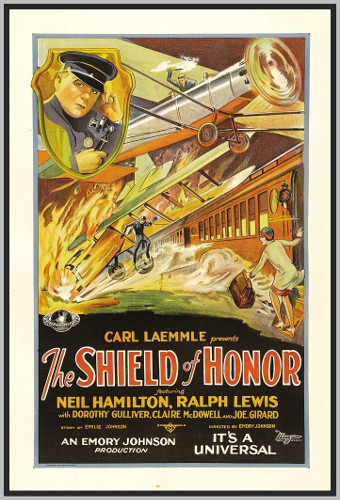
The Los Angeles police force have added an airplane, and Officer Jack MacDowell is going to become the force’s first flying policeman. He’s going to be needed, because there’s been a wave of jewel robberies in the city and all of the victims were people who’d just bought something in a shop owned by Howard O’ Day, even though he’s just as interested in romancing O’ Day’s daughter Gwen. Meanwhile Jack’s 65 year old father Dan has to retire because of regulations, but still wants to be in involved in law enforcement, so gets a job as a security guard at O’ Day’s shop….
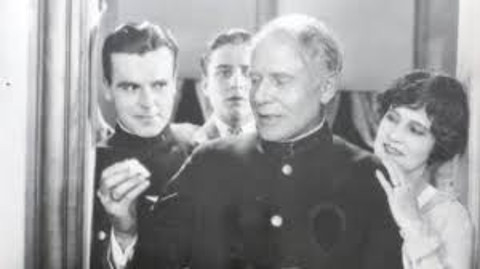
Boy does this film celebrate the police, as over the top an example of ‘copaganda’ as one can find. After an opening scroll extolling the heroism of “that army of heroic men” that’s often abused and misunderstood” and saying how this film is dedicated to them, we get another piece of text saying virtually the same thing, “this picture is dedicated to the unsung knights of today, wearers of the gleaming shield”. The first scene is an award ceremony and along with shots of loads of extras we get extreme close-ups of the medals, before the subject switches to this new plane that the force has been given. The person chosen to fly it is our hero Jack MacDowell, who within minutes whisks the girl he’s only just met away for a ride in the sky [would that have been allowed even back then?] and a frolic in an idyllic countryside haven beside a lake. But the emotional emphasis is on his father Dan, who’s horrified by the fact that he has to retire even though from what I know most policemen can’t wait to get to that time when they have to leave the force. A huge amount of time is spent on his torment, so much so that even audiences in 1927 may have been getting impatient waiting for the investigation and action side of things to get going. But Shield Of Honor still feels carefully crafted to please cinema-goers of the time in its balancing of sentiment, thrills and humour, and it has considerable charm and a simple honesty as long as you can stomach the police worship. It’s also quite stylishly directed by Emory Johnson, who five years before had made the very similar In The Name Of The Law where Ralph Lewis and Claire MacDowell has also played husband and wife, and photographed by Ross Fisher.
The ceremony introduces most of the main characters, and one may sigh when we first see Howard O’ Day’s business manager Robert Chandler because it’s immediately very obvious that he’s a bad guy. However, rather than pretend that this is a secret until we get a supposedly major revelation that actually isn’t one at all, we then cut to him in his villain’s den, a rapid dolly shot [which would have been hard to do at the time considering the size and weight of the cameras] revealing that he’s with some other people living on the wrong side of the law, which include another employee of O’ Day called Rose, a bad girl who disappointingly doesn’t feature much – surely we should get a scene where she tries it on with our hero? Also there is A. E. Blair, who’s about to pretend to be a businessman selling diamonds to O. Day, the latter hopefully not realising that most of these diamonds are ones that have been stolen by Chandler’s other men from O’ Day’s customers. What with Jack constantly going off with Gwen, his poor dad finding it so hard to deal with retirement and Jack’s younger brother Jerry constantly helping himself food in the kitchen in easy comic relief while he and his mother are doing the cooking, it’s a while before the detection and the skullduggery begin in earnest. There also appears to be a missing scene. Jack looks over a plane in a garage that belongs to a certain person who claimed he didn’t like flying, but only afterwards do we learn that he was specifically looking for it. Things work up to a final reel which throws in as much as it can, from a plane chase to fisticuffs to kidnapping to people trapped in a burning building. There’s even a dog who, while he initially annoys because he barks when Jack and Gwen try to kiss, eventually proves himself to be heroic.
Of course we know that old Dan will prove that, actually, he’s not past it at all, even though a pointed early family scene has Jack deliberately lose at arm wrestling to him. One gets the impression that this is a common occurrence in this household, so maybe the family is partly to blame for Dan finding it difficult to face things, though of course the film doesn’t really deal with this and why should it as it was just meant as family entertainment with something to please everyone? Occasionally it touches on spoofing conventions, examplified by Chandler looking startled by his shadow then moving his arms in a menacing fashion, while there are some interesting shots and visual devices. Several jump cuts take Dan’s birthday cake ever closer to us and ram home his horror at the sight; a fight is partly shot from above; a barn in the foreground entirely enveloped in shadow dominates a house in the background. Neil Hamilton, who finished his career with his most seen role, Commissionaire Gordon in the Batman TV series, evokes decency and not much else, but leading lady Dorothy Gulliver has the most appealing smile and Ralph Lewis as Dan does make you feel for his character even though his feelings are hard to believe. After it initially rubbed me up the wrong way, I enjoyed The Shield Of Honor more and more as it went along. Watching it, I realised that, in many ways, what constitutes popular entertainment for the masses hasn’t really changed that much.
Rating: 









SPECIAL FEATURES
Score by Michael Gatt
Tinted sepia, blue for night scenes and red for night scenes involving fire, this 2k restoration is typically impressive for the most part, though is significantly more damaged than Skinner’s Dress Suit with plentiful blemishes. The audio commentary tells us why, and why it was restored in 2k ,not 4k. One of this release’s best features is Gatt’s music score which, despite being done mostly on a synthesiser, aims for an orchestral sweep and sometimes achieves it. His main title, with its rousing aerial theme interspersed with part of the love theme, is a tremendous introduction. Throughout, the blend of sentiment, uplift and suspense [with some distinctly Herrmannesque chords] works excellently, with themes and motifs varied rather than just being simply restated. A great job.
The Shield of Honor – Brand new audio commentary by professor and film scholar Jason A. Ney
Nev provides a track as good as Kalat’s. My chief audio commentary annoyance is when the talker or talkers pad out a track with lengthy biographies, and this one delves straight into some, but let’s face it, most of us don’t know much about these silent movie people, while Hamilton and Gulliver led really fascinating lives [and in Gulliver’s case, deaths]. Nev doesn’t comment as much on specific scenes while they play as Kalat, preferring to spend time giving us contextual background, but it should be of great interest, be it Universal’s curious position among the main studios [why did they aim many of their films at rural audiences?], or the police force of the time in reality being very corrupt and not at all like the depiction in the film. We do also learn that the plane was a replica of the Spirit of St Louis [made famous in the film of that name], even though we don’t really have answered whether the police would have used such a craft or not. Nev even mentions the score and some comments by Gatt.
THE SHAKEDOWN [1929]
RUNNING TIME: 65 mins
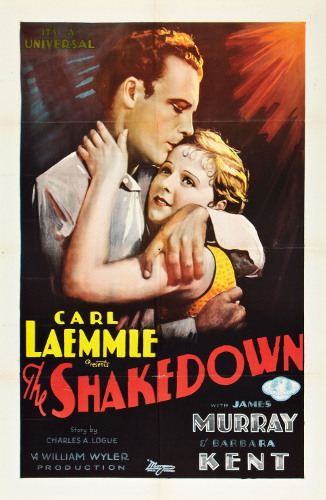
Dave Roberts is a professional boxer better at losing in fixed matches then knocking out his opponents. He turns up in towns and is part of a group which creates a situation so that the locals will bet money on Dave winning a fight against another boxer named Battling Roff, which he will actually pretend to lose. Dave saves a latchkey kid called Clem from a passing train and befriends Marjorie, a waitress. He uses them to garner more support, and as such more bets for his next ‘match’ with Roff, but is beginning to have conflicted thoughts about what he’s doing….
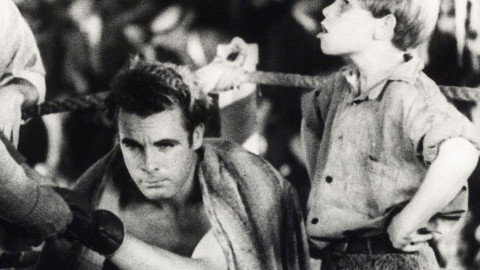
Sharing some of its plot with the earlier The Kid and the later The Champ, The Shakedown, which was one of many silent films made towards the end of the 1920’s which were re-released in a part-sound version, surprisingly undercuts much of the potential sentimentality of a story line about a conman boxer reformed by a spunky homeless boy. The boxer is using the boy, and is even using the girl he likes [she seems to be living with him unmarried, which wouldn’t have been allowed seven years later]. Dave is a louse until very late in the day while the often rude Clem is hardly the typical cute Hollywood kid, which keeps things edgier than expected in this early effort from William Wyler who later had The Best Years Of Our Lives and Ben Hur among his directorial credits. One can already see some experimentation with deep focus and character positioning; check out all that’s going on in the town while people are talking in the foreground, while the opening and closing boxing scenes are shot from a variety of angle for maximum impact. Of course they’re also speeded up, which may lessen involvement for some modern viewers, though there were times where I thought it added to the visceral quality despite its lack of realism. And the choreography is very good indeed.
A shot of balls on a pool table introduces us to Dave, convincing a fellow patron that he can’t be knocked down. A bruiser sitting drinking at the bar challenges him and Dave still manages to avoid him while also pretending that his teeth have been knocked out. The man is powerful boxer Battling Roff who accosts a woman sitting on a bench, causing Dave to storm out to defend her. It looks there’s a shot or two missing where Roff knocks Dave down, but in any case Roff’s his manager challenges Dave to a match which Dave loses, to the consternation of all those locals who bet their drinking money on Dave winning. Well, he pretends to lose, because it’s all a scam, Dave, Roff, Roff’s manager and even the lady – who’s actually Roff’s girlfriend, all being part of the same gang. But not much money was made this time around, so Dave is told to do more to get the inhabitants of the next town, Boomton, on his side and therefore more willing to cough up cash for him. “Pull some heart interest stuff” he’s told. He gets a job working on a construction site by a cafe where Marjorie, whom he likes, works. While chatting her up, hands steal a pie. Said hands belong to young Clem, who Dave chases before Clem stumbles and is nearly crushed by a train before Dave saves hm in the nick of time. “Do you think anyone saw me saving you”? he asks, and is disappointed when the answer seems to be no. He leaves Clem to it, but Clem then shows up at his house, wanting somewhere to sleep. Clem’s animal-like devouring of the pie makes a strong impression on both us and Dave, and Dave starts to becomes Clem’s surrogate father. But his partners want him to ‘fight’ Roff again, and Dave seems to still be going along with the plan – for now.
It’s perhaps hypocritical of Dave to tell Clem off fighting other kids just after he’s publicly sparred with one of the gang; Clem resists for a bit but just has to brawl with a boy who claims that Dave is a fake. But one can entirely understand how Dave can be both horrified and proud at Clem using loaded dice to swindle folk out of a few bucks; Clem shouldn’t be doing this but he’s not much different from Dave. Of course we know how things are going to pan out, but James Murray does a good job portraying Dave’s shame and we’re rightly uplifted by the end. Jack Hanlon is hardly a great child performer though and is actually best in the few comedic moments, like indulging in pulling faces matches with a gang member [Harry Gribbon is able to do amazing things with bis visage], but the script by Clarence Marks and Albert DeMond, from a story by Charles Logue, avoids trying to make him adorable. “Ask her if she’s got a sister”? he yells after Dave when he leaves him for a bit to hang around with Marjorie. Hokeyness is further lessened by Wyler’s already expert stating of certain scenes, like when Dave is about to tell off a naughty Clem who’s just come home and the camera is right behind Dave whose form is darkened, making him seem menacing. Of course the shot most will remember is when Dave is going up and down a a crane hoist and the camera is with him – and yes, it dos look like it’s Murray and the cameraman way up there. The tale is taken at exactly the right pace and this is perhaps the smoothest of these three films to a modern audience, though some may find the moment where Clem admires Dave’s physique to be rather off; it clearly wasn’t intended to be though at the time.
Rating: 









SPECIAL FEATURES
Score by Michael Gatt
This one’s another 4k restoration, though there was clearly a lot of damage that Universal, who did these, could not do much with. Gatt’s piano-led music score sounds perhaps the most authentic of the three scores here. It piles on the pathos without descending into bathos while jazz harmonies evoke the environment of crooks and bets.
Brand new Audio commentary by film writer Nick Pinkerton
This is my least favourite of the commentaries in this set, largely because Pinkerton spends way over half of it going through biographies. I understand that there’s not much production info, but surely he could have been a bit more scene specific [he is occasionally, but far less than Kalat or Ney] or gone into . We do learn that many found it hard to adjust to making talkies because they didn’t have the freedom of allowing inter-titles to change plot or meaning despite what performers were saying in reality, have some speculation about the talkie version,and have some of Wyler’s devices pointed out. It’s not a terrible track; some who know little about the folk involved may find it reasonable even if they are treated to the second biography of Universal head Carl Leammle in this set.
SPECIAL FEATURES
Limited Edition O-Card slipcase [2000 copies]
1080p presentation on Blu-ray from restorations undertaken by Universal Pictures (Skinner’s Dress Suit and The Shakedown restored in 4K,
The Shield of Honor restored in 2K)
A collector’s booklet featuring new writing by critic Richard Combs and film writer Andrew Graves
I wouldn’t say that any of these three films are really classics, but, especially ‘The Shakedown’, they’re all well balanced entertainments and pretty accessible for modern viewers who are not too experienced in silent movies too. Recommended.


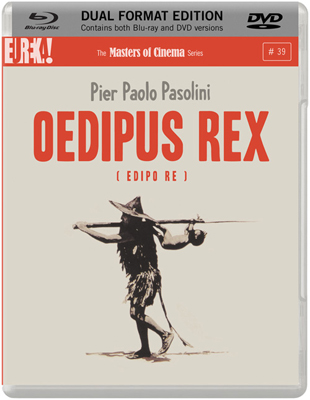
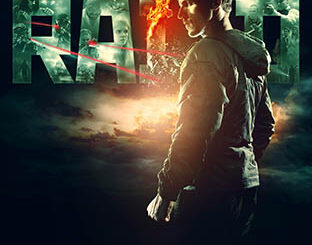
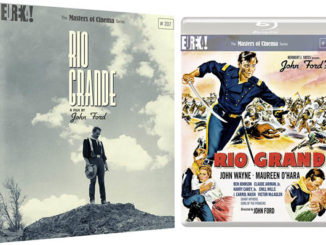
Be the first to comment